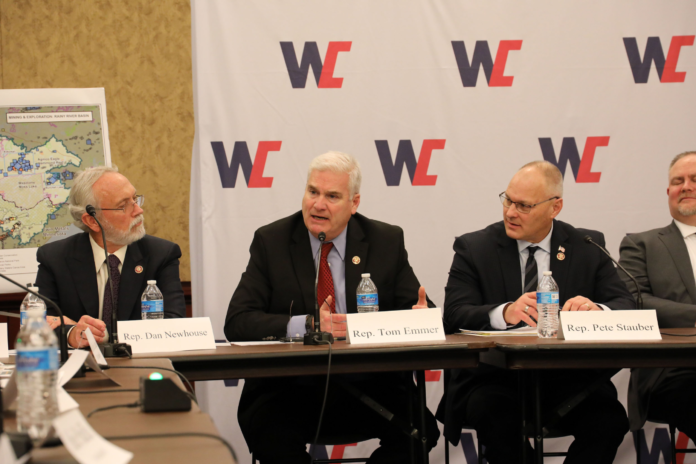Two congressmen — Reps. Tom Emmer of Minnesota and Patrick McHenry of North Carolina — are calling on the Congressional Budget Office (CBO) to analyze the potential economic impact of the Democrats’ massive spending bills.
The two representatives wrote a letter addressed to CBO director Phillip Swagel. Emmer is the lead Republican on the Subcommittee on Oversight and Investigations, while McHenry is the lead Republican on the House Financial Services Committee.
“We request that CBO update its September 2020 report to include the effects of the December and March spending,” the letter reads. “CBO should also include a projection of the impact the $1.2 trillion Infrastructure Investment and Jobs Act and the $3.5 trillion in new spending associated with reconciliation will have on the economy.”
Emmer and McHenry specifically request that the report include details of the bills’ impact on “consumer prices, employment, wages and overall economic conditions.” They believe, like many congressional Republicans, that the bills are “reckless” and “irresponsible.”
Since the CBO’s September 2020 report, titled “The Effects of Pandemic-Related Legislation on Output,” Congress has spent $2.9 trillion responding to the COVID-19 pandemic, $900 billion last December and $2 trillion this March. It is only reasonable, Emmer and McHenry argue, for the CBO to account for this and an additional $4.7 trillion that could still be passed in an updated report.
“This massive spending spree will have short and long-term implications for the economy, including on GDP and inflation,” the letter reads. “Current CBO fourth quarter projections suggest GDP will grow to 7.4 percent, inflation will hold at 2.8 percent, and unemployment will drop to 4.6 percent.”
The congressmen add that the economy appears to be “slowing as prices continue to rise” and “there continues to be a significant disconnect between employers and workers.”
“We are concerned that massive new spending will only exacerbate this negative trend,” they write.
Emmer is not the only Minnesota Republican to fight against the Democratic spending bills. On Tuesday Rep. Michelle Fischbach of Minnesota announced her opposition to them before her colleagues in the House.
“Our country’s infrastructure should not be tied to the Democrats’ partisan spending spree, especially during a pandemic,” she said. “But here we are. Until Democrats stop playing games and work with their colleagues on a truly bipartisan compromise, I urge my colleagues to oppose this rule and the underlying bills.”

















